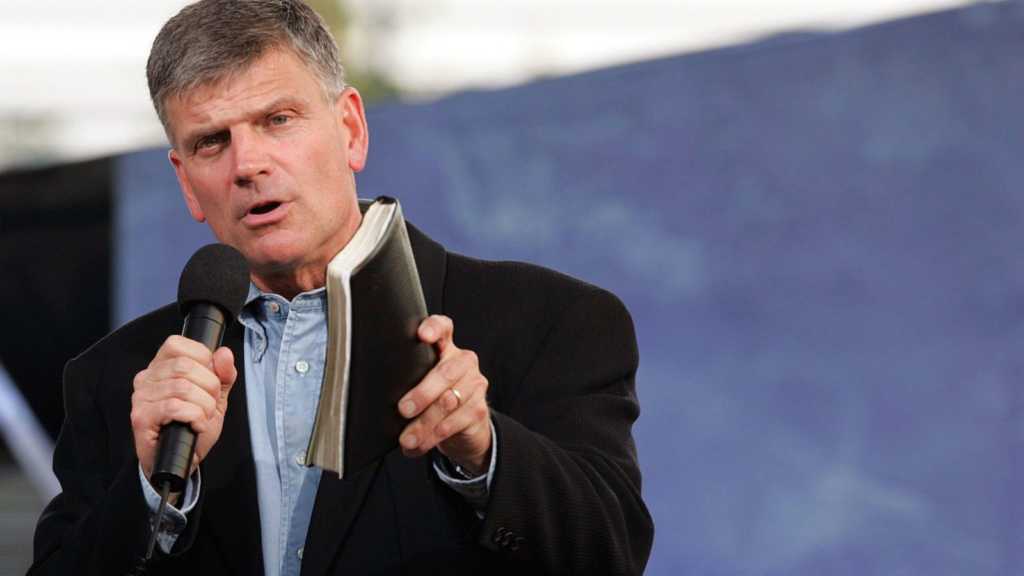This past week around 50 evangelical leaders met at Wheaton Collge in Illinois to discuss the status of evangelicalism in America. The meeting highly targeted President Trump and evangelicals that support him, including Franklin Graham.
Franklin Graham decided to weigh in on the Wheaton College meeting, and talk about what makes an evangelical.
The meeting, which took place on Monday and Tuesday, was primarily made up of evangelicals that have become disheartened with the Trump White House.
Graham wrote on his Facebook:
“Recently some people have had discussions about the state of evangelicalism today, almost referring to it as a politically-related term. I can’t speak for others, and I’m certainly not a spokesperson for any kind of evangelical movement, but I can tell you what I believe.
“I believe in God. I believe in His Son, Jesus Christ. And I believe in the Holy Spirit,” Graham said. “I believe my God is three-in-one. I believe that God sent His Son, Jesus Christ, to this earth to take our sins. That He died on a cross and shed His blood for all the sins of mankind. I believe He took our sins to the grave, and I believe in the resurrection. God raised Him to life on the third day, and I believe He is coming again. This is God’s Gospel.”
Graham, who is the son of the late Billy Graham, and now president of the Billy Graham Evangelistic Association, went on to explain what Jesus called his followers to do. He stated that we are called to, “go into all the world and proclaim the gospel.”
“I believe without Christ, a soul will be lost, condemned to hell for all eternity. This should motivate all of us to share the Good News of God’s love to a sick, dying, and compromising world. I am called and committed to preaching this message as long as I have breath or until the Lord returns,” he continued.
Evangelical has become a term that has been thrown around and given different definitions than what it truly means, Graham said. Graham said that today many people view the term evangelical in a political context, and reminded that it is solely a theological term.
“Evangelism is simply reaching the lost with this message,” he argued.
“We should be concerned about how we can reach more, and not get sidetracked. A number of years ago Nike had an ad that said, ‘Just Do It!’ That’s our job — that’s what we are to do today.”
Some of the prominent evangelicals at the meeting at Wheaton College included Tim Keller and A. R. Bernard. Many believed that it was an anti-Trump meeting because none of the evangelicals who support Trump were invited.
During the meeting, many pointed fingers at white Christians, questioning how they could support President Trump.
North Carolina African-American Bishop Claude Alexander was quoted as saying: “How could white Christians mourn the deaths of the Charleston Nine but politically support a presidential candidate who appeals to the ideology held by the Charleston murderer?”
“That was the idea that this had a political agenda to it and that kind of thing or that it was about being anti-one particular group, which it wasn’t. It was about discovering with one another where we are and where we see things and how that relates to the ministries that we participate in,” Bock emphasized.
“The core topic that was addressed was thinking through the consistency of our Christian walk.”
Even though they did not explicitly say they were anti-Trump, most of the sentiments heard about him were negative. CBN News reported that there was a lot of “Trump bashing” heard at the Wheaton meeting.
Some participants claimed to feel uncomfortable with the “one-sided venting” against Trump and his administration. Some of the participants that felt that way actually left after the first day, skipping the second half of the meeting.
The meeting gained critique from prominent evangelicals who felt it was a direct attack against them. Johnnie Moore, a pro-Trump evangelical, was one of many evangelicals not invited to the meeting.
“We don’t take it personally; we just pray for them. I’ve said it many, many times, but I’ll say it again: we have been honored to fight to protect religious liberty that even extends to protecting the rights of those who disagree with us on religious grounds, even when they are unkind,” Moore said in a statement to CBN News.
Another evangelical, Richard Land of the Southern Evangelical Seminary also question what the purpose of the meeting was, given that many well-known evangelicals were left uninvited.
“Any definition of ‘thought leaders’ and any definition of evangelicalism that excludes the Billy Graham Evangelistic Association and Franklin Graham is a pale imitation – anemic and incomplete,” said Land.
On Facebook, Graham asserted that he is “not interested in fanning out in all kinds of directions,” that he wants to focus on one direction – Jesus Christ.
“I’m interested in focusing on one direction — reaching lost souls with the Gospel of Jesus Christ,” Graham stated. “It is calling people to cross the line from death to life, in Him. That’s evangelism. And that’s what evangelicalism should be about.”
Graham continued to point out the most important part of his mission is to bring the Gospel “to as many as possible” through the Billy GrahamEvangelistic Association and Samaritan’s Purse, an evangelical-based humanitarian organization he runs.
Beth Moore’s 5 Keys to Avoiding the ‘Toxic’ Celebrity-Like Culture Sweeping Through the Church
“I’m going to continue to do what I have been doing for some 40 years — feed the hungry, clothe the naked, provide medical care for the sick, bring comfort to those ravaged by wars and storms — so that I can reach them with the truth of God’s love, that He sent His Son Jesus Christ to earth to take our sins to the cross.”
You can read Graham’s full post below:
https://www.facebook.com/FranklinGraham/posts/1897341550322017



